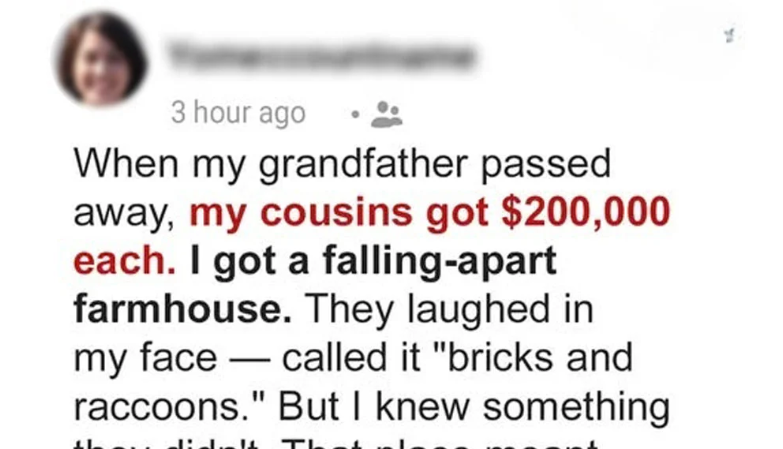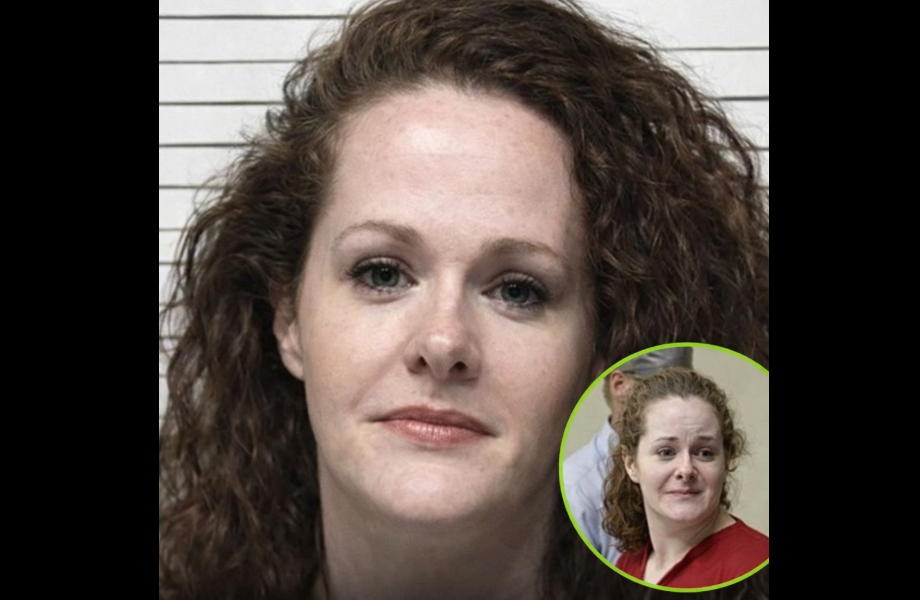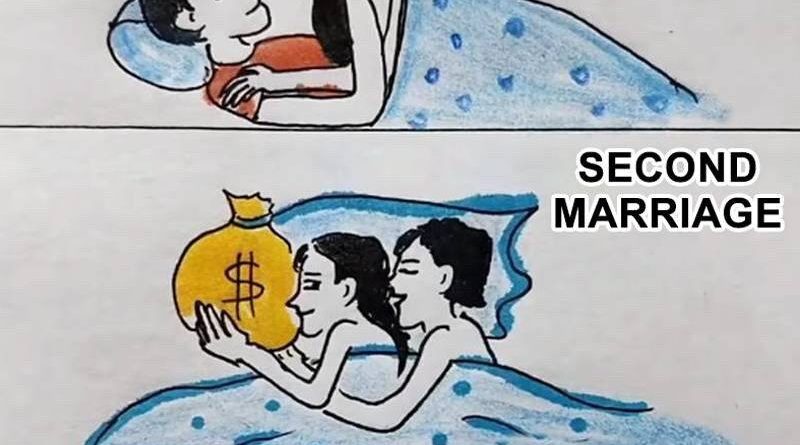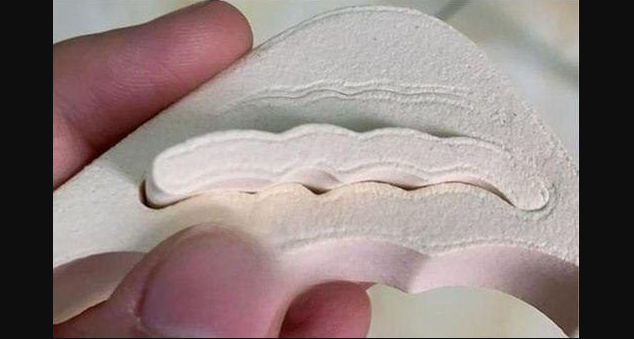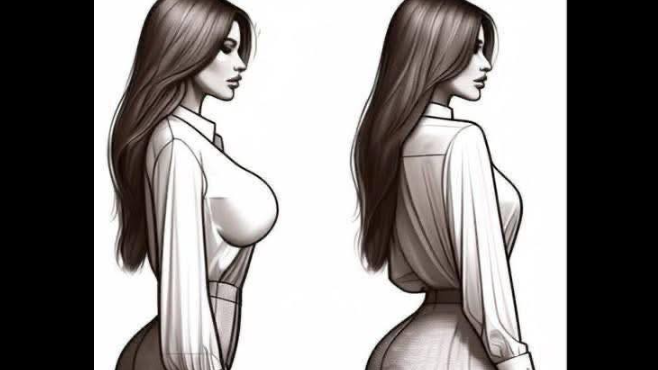When my grandfather passed away, my cousins each received $200,000 in cash. I inherited a crumbling farmhouse. They mocked me openly, dubbing it “bricks and raccoons.” Yet I held a secret they didn’t. That house was Grandpa’s heart. So I settled in, scrubbed every surface, and one afternoon, while repairing the basement, I spotted a wobbly panel in the wall.
Behind it lay a concealed room. Inside that room stood an old filing cabinet labeled “Private.” I pulled open the drawer… and froze in disbelief. There, I discovered stacks of faded envelopes—some sealed, others ripped open—marked with dates and unfamiliar names. Among them was a thick, yellowed manila folder with my name scrawled across it: “FOR ZARA, WHEN SHE’S READY.”
My hands trembled.
I sank to the basement floor, legs crossed on the chilly concrete, and opened the folder.
Inside were bank statements, property deeds, and stock certificates—all valid, all active, all in my name. Together, they totaled over $2 million in assets. Grandpa had quietly transferred everything to me before his death, keeping it hidden from the family.
There was also a letter.
I still recall its opening words: “If you’re reading this, Z, it means you stayed. You saw the worth where others saw none.”
Tears came. No use pretending otherwise. I sat in that dusty room, sobbing like a child. Grandpa hadn’t seemed wealthy in my childhood—not in the obvious ways. He wore threadbare flannel shirts, bought store-brand ketchup, and let the lawn grow wild because, “it’s only grass.”
But he shared stories with me. Showed me how to mend drywall. Took me to auctions to “sense the value.” Every summer, we’d sit on the porch with coffee, just him, me, and the chirping birds.
It turned out he’d been quietly investing in land and obscure stocks for years, buying low and holding on. He never spoke of it. Instead, he tucked it all into this folder, passing it to me—not to my cousins with their sleek condos and designer bags. To me.
At first, I kept it to myself. I needed to absorb it, to feel the weight of someone’s trust in me.
But secrets don’t stay buried.
The will was clear: the house was mine. The assets, though, were off the books—legal transfers completed years earlier, separate from the estate.
I told my mom first. Her eyes widened.
“Your grandfather had that much?” she murmured. “He always acted like he was barely getting by.”
I smiled. “Guess that was his way.”
We sat on the porch, gazing at the field he used to mow himself. Then she grinned.
“He always said you had his soul.”
Things shifted after that.
Word spread.
Not from me—I’m certain. But two weeks later, my cousin Janelle rolled up in her Lexus, uninvited.
She wandered through the kitchen, eyeing everything without a greeting.
“I heard you’re fixing the place up,” she said, sipping my soda without asking.
“Yeah,” I replied. “Starting with the pipes. They’re ancient.”
She nodded, her gaze sweeping the room. “Grandpa always said this house could be a gem with some effort.”
I smiled tightly.
Then she dropped it.
“If you ever want to sell, I might be interested. My fiancé and I need a wedding venue.”
I stared. “You laughed when I got this house.”
She smirked. “Yeah, well, we figured you’d sell it quick, not move in.”
I didn’t mention the hidden room, the folder, or the stocks still climbing in value.
Instead, I said, “It’s not for sale.”
She left, clearly annoyed I didn’t fawn over her engagement ring.
After that, cousins started appearing. One brought pastries, another wine, all claiming fond memories. Suddenly, it was “We loved this old place” and “You and Grandpa were so tight.”
Right.
But I saw through it.
One evening, I caught cousin Nico poking around the barn, claiming he was “searching for his old baseball glove.”
We never played baseball.
I didn’t confront him. Just escorted him to his car and locked the gate.
That’s when it hit me: inheritance reveals people’s truest selves.
But the story didn’t end there.
While they hovered like hawks, I got to work.
I found Grandpa’s old journal behind an upstairs bookshelf, wedged between dusty law books and a broken radio. It wasn’t a diary—more a ledger with scribbled notes.
He’d written things like:
“Barn roof leak—fixed 2006. Replace soon? Let Z try.”
“Sunroom plan: Hold off for now. She’ll get it.”
“I think she feels the quiet like I do.”
It felt like he was speaking to me across time.
I began renovations based on his notes, not altering but honoring his vision. I used his tools and hired locals he’d trusted.
One, a handyman named Renzo, had worked for Grandpa for decades. When I hired him to shore up the sunroom’s foundation, he refused payment upfront.
“You’re his girl,” he said. “He saved my shop once. This is my thanks.”
I learned Grandpa had quietly helped many in town during tough times. No fanfare, just envelopes slipped under doors.
I found one in the filing cabinet—marked “M. Okoro – 2008.” A mortgage, paid off completely.
Everywhere I looked, I found more stories. Hardware store clerks nodded at my last name. The town librarian hugged me when I mentioned the house.
“Your grandpa was pure gold,” she said.
I started to see it.
He hadn’t left me a house. He’d left me his legacy—a tapestry of quiet generosity.
But the biggest twist was still coming.
Three months after moving in, I got a letter from a lawyer. Not mine—cousin Vaughn’s.
They were challenging the will, claiming Grandpa was “coerced” into giving me the house, that he “wasn’t of sound mind.”
I laughed. Grandpa, not in control? Never.
But they were serious.
Court hearings, depositions, mediation—it dragged on. My aunts and uncles piled on. Accusations flew.
It was draining.
But I stood firm.
The judge asked for proof of Grandpa’s intent. I brought the ledger, the letters, the folder with my name.
Then I said something unplanned: “He chose me because I listened. He spoke, and I heard him.”
The judge ruled in my favor. The house remained mine.
Outside the courthouse, Vaughn confronted me.
“You think you’re some saint?” he snapped. “Living in that wreck like it’s noble?”
“No,” I said. “I just know the difference between price and meaning.”
He didn’t understand.
But after that, things quieted. The visits stopped. The fake nostalgia faded. I was left in peace.
Over the next year, I transformed the farmhouse into something Grandpa would’ve loved.
The porch was rebuilt. The sunroom restored. I even launched a small business, renting it out for artist retreats and weekend escapes.
People came from far and wide, drawn to a “quiet place with stories in its bones.”
That’s what the farmhouse became—a home woven with stories.
Sometimes, I sit on the porch with coffee, watching the sunrise over the field. I think about how close I came to missing it all—if I’d sold the house or overlooked that panel.
People think inheritance is about wealth.
But sometimes, it’s about being chosen—to carry someone’s heart, their secrets, their truths.
Grandpa didn’t only leave me assets. He gave me a map to who he was. That’s beyond price.
My cousins got their $200,000, spent it fast from what I hear.
I got the house. The legacy. The truth.
And I know I got the better end.
If you’ve ever felt overlooked, hold on. The long road often holds the greatest rewards.
Share this story if it resonated with you 💛
